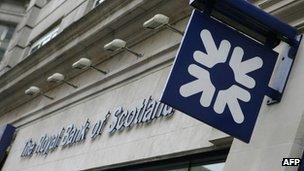RBS: 'Two more years of pain'
- Published
- comments

RBS today reported its fourth year of losses since the bailout of 2008
It matters to all of us that RBS is returned to health, because we as taxpayers invested more than £45bn in the bank to prevent it going bust, and at the current RBS share price we are currently sitting on a loss of £20bn on that investment.
So if we want all the schools, hospitals, roads and railway tracks that £45bn can buy, we've got to hope that RBS starts making substantial, sustainable profits again - so that taxpayers' 82% stake in the bank can be privatised at something more than 51p per share we paid for it.
It will be a long haul. Stephen Hester, on the Today Programme this morning, external, confirmed that rehabilitating the bank is a five year process, with two years to go.
What will I think disturb many is that last year losses at RBS actually got bigger: the loss before tax increased from £399m to £766m; and the loss attributable to shareholders (a big hello to all of us) was a touch less than £2bn, up from £1.1bn.
In other words, the path to recovery is not seamless. So what's gone wrong?
Well, the world economy - especially the eurozone bit of the world - has gone wrong. And no big bank can insulate itself from general economic conditions.
Thus RBS has taken a loss of over £1bn on its loans to the Greek government, its holding of Greek government bonds. You can see this, in a way, as an event beyond RBS's control, if you wish to be generous to the bank. On the other hand, no other British bank piled into Greek government debt to quite the same extent.
Also RBS is still making colossal losses in Ireland, thanks to its ownership of Ulster Bank. And there was an £850m charge to cover costs of compensation for those mis-sold PPI credit insurance (painful, but a peccadillo perhaps compared with Lloyds £3.2bn PPI costs).
And then there are what might be seen as the necessary losses, the impact on the corpus of Royal Bank of Scotland of the painful medicine being administered by Stephen Hester. He is selling loans and investments regarded as surplus to requirements, and potentially toxic. And in accelerating the shrinkage of the bank in this way, he is accelerating the crystallisation of losses.
A mixed picture
So I suppose what really matters is what's happening to RBS's engine underneath all of this.
Well, it is a mixed picture.
RBS's retail bank, used by millions of people, saw operating profits rise 45% to £2bn. The insurance business, that bloomin' annoying bulldog (oh yes), swung from a loss of £295m to profits of £454m (and the plan is to float Churchill and the rest of the insurance operation on the stock market in the second half of this year).
But RBS's investment bank saw profits more than halve, to £1.56bn - which was a bit worse than the performance at Barclays' investment bank, where profits fell by a third.
Which takes us, inevitably, to the contentious issue of bonuses.
RBS claims it is extracting more bang from the bucks it is paying to investment bankers: aggregrate bonuses paid to them were cut 58% to £390m - which equates to an average bonus of £22,941 per head.
But it is total pay of the investment bankers, not just the bonuses, which really matters. And RBS says that the average remuneration of its 17,000 investment bankers has fallen from £152,300 to £112,000.
That is a reduction in the investment bankers' pay of 26.3%, which is less than half the reduction in the investment bank's profit.
So there will be some who complain that the investment bankers' rewards are not aligned closely enough with the performance of their business (their pay soars in the good years, but doesn't fall commensurately in the bad years).
Away from the noise generated by pay, Royal Bank of Scotland does seem to have become a safer bank under Mr Hester's stewardship.
It is far less reliant than it was on borrowing from unreliable providers of funds, such as other banks and big financial institutions.
In 2008, its loans and investments were equivalent to 154% of relatively stable, dependable customer deposits. Today that ratio is 108%. Which means that if there were a return to credit-crunch conditions, RBS would be much less likely than it was to fall over for want of access to vital funds.
Similarly its balance sheet has shrunk. Stephen Hester is taking great pleasure in claiming today that he has offloaded debt equivalent to twice the total borrowings of the Greek government. I am not sure how he comes up with that number, since RBS's published total assets seem to me to be down £500bn over the past three years - which is a big number, but not double Greece's public sector debt of £300bn odd.
And to be clear, the cutting of RBS down to safe size is work in progress: RBS's total assets are £1.5tn, not much changed from last year and still about the same size as the UK economy (and yes I know I am comparing a stock with a flow, but it is a useful way of judging whether - in a worst case - the UK could afford to bail out RBS a second time).
What do you get when you put all this together? Well RBS is much less likely to bankrupt all of us than it was, but no one can be confident that it will ever be able to repay us.
UPDATE 11:47 GMT
To put RBS's average pay per investment banker of £112,000 into context, it compares with £199,000 at Barclays Capital.